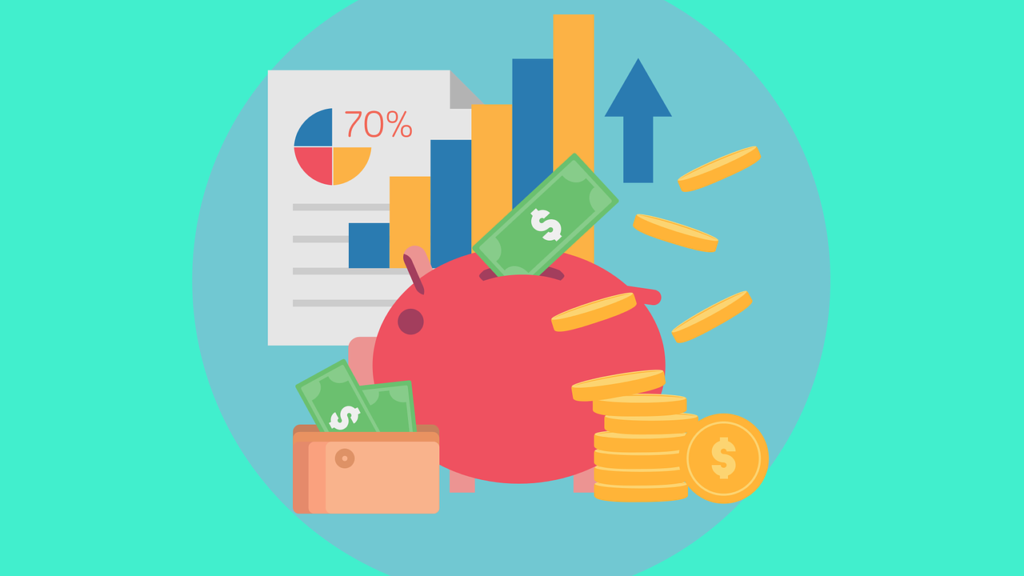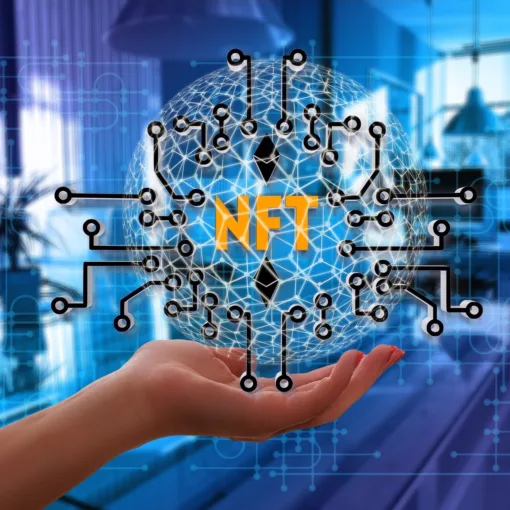Blockchain technology has emerged as a transformative force in recent years, altering the landscape of various businesses. The influence of Blockchain is evident and far-reaching, ranging from banking to healthcare, supply chain management to entertainment. In this in-depth study, we examine the potential and real-world uses of Blockchain technology across a variety of sectors. Discover how this decentralized marvel is bringing in a new era of transparency, security, and efficiency with us.

Table of Contents
Introduction
Are you curious about the technology that’s changing the game across industries? We’re talking about Blockchain Technology, the innovative force that’s transforming the way we do business, share information, and ensure security. During this article, we delve into the world of blockchain technology and its transformative impact on various industries. As pioneers in the field, we are dedicated to providing you with an in-depth understanding of blockchain and its potential applications. We aim to surpass existing articles and become your go-to source for accurate, up-to-date, and engaging content on this revolutionary technology.
What is Blockchain Technology?
Blockchain is a decentralized, distributed ledger technology that enables secure and transparent transactions without the need for intermediaries. At its core, it consists of blocks of data linked together cryptographically, forming an immutable chain. This design ensures that once information is recorded, it cannot be altered, providing unparalleled security and trust in the digital realm.
At its core, blockchain is like a digital ledger, recording transactions in a way that’s secure, transparent, and unalterable. Imagine a notebook shared among multiple people, where each change is recorded in a new page, creating an irreversible timeline. This revolutionary technology ensures that once information is added, it can’t be changed without leaving a trace.
How Does Blockchain Work?
Think of blockchain as a chain of blocks, where each block contains a set of transactions. These blocks are linked together, forming a chain, hence the name. But here’s the twist: the chain isn’t stored in a single place. It’s distributed across a network of computers, making it highly resistant to tampering. This decentralized structure eliminates the need for intermediaries, reducing costs and boosting efficiency.
The Advantages of Blockchain
1. Enhanced Security
Blockchain’s cryptographic nature safeguards data from unauthorized access and tampering. Its consensus mechanisms, such as Proof of Work (PoW) and Proof of Stake (PoS), further reinforce its security, making it resistant to attacks and fraud.
2. Transparency and Immutability
Every transaction recorded on the blockchain is transparent and accessible to all participants in the network. This transparency, combined with immutability, creates a trustless environment where all parties can verify the integrity of the data.
3. Decentralization and Disintermediation
Blockchain eliminates the need for intermediaries like banks or payment processors. This decentralization not only reduces costs but also removes single points of failure, making systems more robust and efficient.
Blockchain in Industries
1. Security and Transparency: Blockchain’s Stronghold

Blockchain’s security is its hallmark. Each transaction is encrypted and linked to the previous one, creating a chain that’s practically impossible to alter. This makes it a game-changer for industries like banking and finance, where secure and transparent transactions are paramount.
In the realm of financial services, blockchain technology has emerged as a game-changer, introducing heightened security and transparency. Traditional financial transactions often involve intermediaries, leading to delays and increased costs. However, blockchain eliminates the need for intermediaries by enabling direct peer-to-peer transactions. This not only expedites the process but also reduces the risk of fraud and human error.
2. Blockchain in Banking and Finance: A Seamless Revolution

The financial sector has been quick to recognize the potential of blockchain technology. Traditional banking systems often involve intermediaries and time-consuming processes for transactions. Blockchain has the power to streamline these operations by enabling direct peer-to-peer transactions, eliminating the need for intermediaries and significantly reducing transaction times. The inherent security of blockchain also ensures that financial data is tamper-proof and resistant to fraud, instilling trust in a system that has long been plagued by security concerns.
Furthermore, smart contracts powered by blockchain code allow for automated execution of agreements once predefined conditions are met. This innovation streamlines processes, reduces administrative burdens, and enhances trust between parties. Financial institutions are now exploring blockchain to facilitate cross-border payments, trade finance, and even the issuance of digital currencies.
3. Healthcare Revolution: Securing Patient Data and Interoperability

In the realm of healthcare, blockchain is proving to be a game-changer in maintaining the integrity of patient data and enhancing interoperability among various stakeholders. Electronic Health Records (EHRs) stored on blockchain ensure that patient information remains accurate, secure, and easily accessible by authorized parties. This innovation fosters collaboration between healthcare providers, reduces administrative overhead, and ultimately leads to better patient care.
Healthcare is embracing blockchain for its potential to secure sensitive patient data. With interoperable and tamper-proof records, doctors can make better-informed decisions, and patients have more control over their health information.
By adopting blockchain, healthcare organizations can establish a secure and decentralized network where patient data is encrypted and accessible only to authorized parties. Patients can have greater control over their health records and grant temporary access to healthcare professionals as needed. Moreover, blockchain ensures data integrity and reduces the risk of data breaches, ultimately leading to improved healthcare outcomes.
4. Supply Chain Management and Traceability: A New Era of Accountability
The supply chain industry is undergoing a significant transformation through blockchain integration. With consumers becoming increasingly conscious of product origins and authenticity, companies are leveraging blockchain to provide end-to-end traceability. Each step of a product’s journey can be securely recorded on the blockchain, ensuring that information about its origin, manufacturing, and transportation remains tamper-proof.
Blockchain’s impact on supply chain management is profound, introducing a new level of transparency and traceability. Through blockchain, every step of a product’s journey can be recorded in an immutable ledger, ensuring authenticity and quality control. This has far-reaching implications, from combating counterfeit products to promoting ethical sourcing practices. Consumers are empowered with information about the products they purchase, leading to a more informed and conscientious marketplace.
This heightened level of transparency not only meets consumer demands but also plays a crucial role in mitigating issues such as counterfeit products and supply chain disruptions. Through blockchain-enabled supply chain management, industries can enhance accountability, optimize processes, and build a stronger rapport with their customer base.
Blockchain is revolutionizing how products reach your hands. By tracing each step of a product’s journey, from raw materials to production to distribution, companies can ensure quality, authenticity, and ethical sourcing.
5. Real Estate: Redefining Property Transactions

Buying property is often a complex and lengthy process. But with blockchain, property transactions become transparent, secure, and efficient. Smart contracts ensure that conditions are met before funds are released, reducing fraud and disputes.
Blockchain’s ability to establish tamper-proof property records simplifies real estate transactions, reducing paperwork and minimizing fraud. Smart contracts facilitate automatic payments upon the fulfillment of predefined conditions, making property transactions efficient and secure.
Smart contracts, self-executing contracts with the terms of the agreement directly written into code, are automating and streamlining legal and real estate processes. This leads to reduced processing times, minimized fraud, and increased accuracy.
6. Energy Sector: Paving the Way for Efficiency
Blockchain is reshaping the energy sector by enabling peer-to-peer energy trading. Excess energy generated by individuals or businesses can be directly sold to others, promoting sustainability and efficiency.
Blockchain’s decentralized nature is reshaping the energy sector. It allows for efficient management of distributed energy resources, facilitates peer-to-peer energy trading, and enhances grid reliability.
7. Automotive Industry: Driving Trust through Blockchain

One of the significant challenges in the automotive sector has been verifying the provenance of vehicles and their components. Blockchain addresses this by providing an immutable record of every step in the manufacturing process. This ensures that each vehicle’s history, from assembly to delivery, can be traced with utmost accuracy.
The complexity of the automotive supply chain demands a robust system for tracking and managing components. Blockchain enables real-time tracking and verification of parts, reducing delays and ensuring that only genuine parts are used in vehicle assembly.
Buying and selling vehicles involve intricate paperwork and verification processes. Blockchain simplifies this by creating digital, tamper-proof ownership records. This not only expedites transactions but also mitigates the risk of fraudulent activities.
Blockchain technology enables a seamless maintenance process by storing a vehicle’s service history and repair records securely. This allows mechanics and service centers to access accurate information, leading to quicker and more precise repairs.
8. Blockchain in the Entertainment Industry: Empowering Content Creators

The entertainment industry has also embraced blockchain technology to address long-standing challenges in the realm of intellectual property. Musicians, artists, writers, and content creators of all kinds can now protect their work through blockchain-based authentication and copyright systems. Smart contracts enable automatic royalty payments and ensure that creators receive fair compensation for their contributions, revolutionizing the way creativity is valued and rewarded.
Blockchain allows creators to directly sell their work to consumers, ensuring fair compensation and protecting intellectual property rights.
The entertainment industry is utilizing blockchain for rights management, content distribution, and fan engagement. Artists and creators can maintain more control over their work, and fans can have a direct and transparent relationship with their favorite content.
Future Implications and Beyond: Exploring the Uncharted Territories
The implications of blockchain technology are far-reaching, and its potential is not limited to the sectors discussed above. Industries such as real estate, legal, energy, and more are all ripe for disruption through blockchain’s decentralized and transparent nature. As the technology continues to evolve, it is imperative for businesses to embrace innovation and explore ways to integrate blockchain into their operations.
In a world driven by data, blockchain holds the promise of empowering individuals and organizations alike to have greater control over their digital assets and information. While challenges and regulatory considerations remain, the undeniable benefits of blockchain technology are steering industries towards a new era of efficiency, security, and collaboration.
So there you have it—Blockchain Technology, the game-changer that’s reshaping industries and our daily lives. Its decentralized and secure nature is unlocking new possibilities, promising a future that’s more transparent, efficient, and connected. Whether you’re in finance, healthcare, or simply curious about technology’s impact, the blockchain revolution is worth keeping an eye on.
Conclusion
In conclusion, the advent of blockchain technology marks a paradigm shift across industries, redefining the way businesses operate and engage with their stakeholders. From enhancing security and transparency in financial services to revolutionizing supply chain management and healthcare, blockchain’s transformative power is undeniable. As businesses continue to explore and harness its capabilities, the future holds immense potential for a decentralized and interconnected world.
FAQs
- What is the main advantage of blockchain technology?
Blockchain’s main advantage is its unparalleled security and transparency, making transactions and data sharing highly secure and tamper-proof. - Can blockchain be used beyond financial transactions?
Absolutely! Blockchain has a wide range of applications beyond finance, including healthcare, supply chain management, real estate, and more. - How does blockchain ensure trust in a trustless environment?
Blockchain achieves trust through consensus algorithms and cryptographic verification, eliminating the need for intermediaries and third parties. - Is blockchain energy-intensive?
While some blockchain networks can be energy-intensive, there’s a growing focus on developing more energy-efficient consensus mechanisms. - Is blockchain still in its early stages?
While blockchain has made significant strides, it’s fair to say that we’re still in the early stages of exploring its full potential across various industries.




One thought on “The Power of Blockchain Technology in 8 Industrial Revolution”
Thanks for sharing. I read many of your blog posts, cool, your blog is very good.